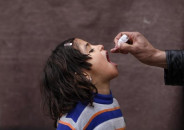KMC forms seven teams to check markets for sick animals
Hospitals ready for Eid related emergencies

File photo of the Karachi Metropolitan Corporation. PHOTO: FILE
A 20-bed special ward has been established at Abbasi Shaheed hospital. Seven committees, headed by the Karachi Metropolitan Corporation's senior director of medical and health services, Dr Salma Kausar Ali, consisting of senior doctors have also been formed.
The teams have been directed to make surprise visits to animal markets in different areas of the city and check if any animal carries tics. The teams have been authorised to take any sick animals into custody.
"There are sick animals in markets," said Dr Ali. "Citizens should take extra care and avoid purchasing those sick animals," she advised.
Dr Ali, along with her teams, visited different markets on Thursday and said that there are also some animals which carry tics. She also said that thousands of people visit animal markets and they can be affected if extra measures are not taken. She pointed out that water has also been stored at the markets, which could spread dengue fever among visitors.
Karachi's health executive officer Dr Zafar Ejaz said that hospital staff has been directed to remain available round the clock. Special care is taken in all health facilities during the three-day Eid celebrations. "Patients with over-eating and gastro can visit any health facility in the city," he said.
He said that awareness sessions have also been held in animal markets and medical staff has also been trained to deal with cases of the Congo virus. "We had some patients last year but they were reported after Eid," he pointed out.
An isolation ward has also been set up at Jinnah Postgraduate Medical Centre (JPMC). Most of the patients are usually admitted to the JPMC. According to JPMC's joint executive director and the incharge of the emergency ward, Dr Seemin Jamali, it is a viral infection and is transferred from animals to humans. The incubation period is three to nine days, she explained. "The JPMC is ready to meet any emergency," she said.
Published in The Express Tribune, September 25th, 2015.



















COMMENTS
Comments are moderated and generally will be posted if they are on-topic and not abusive.
For more information, please see our Comments FAQ